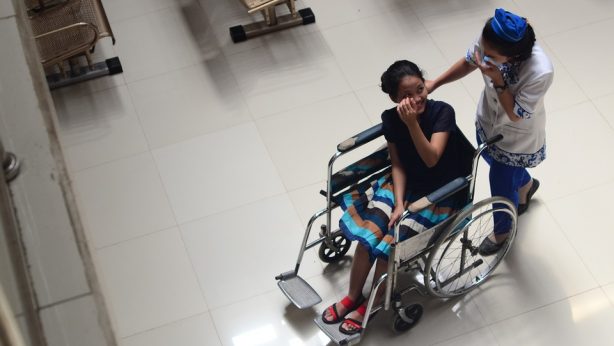Choosing whether or not to study abroad can be a daunting task – let alone figuring out where to study abroad and when. For those who live with chronic illnesses or physical disabilities, the choice can be even harder.
Studying abroad is not impossible to do when you have physical aspects of yourself holding you back—but with a little bit of planning, it can and will be possible.
Talk to your Doctor(s)
First things first, talk to your primary doctor, your specialist doctor, even to your physical or occupational therapist— whoever is seeing you for whatever condition you have, have a conversation about them about the possibilities of going abroad.
Do it with sufficient amount of time- don’t bring it up just a few weeks before the study abroad application is due. And don’t keep your hopes up that you will study in the spring, for example—if your doctor(s) approve of you going abroad, you may have to delay it by a semester. Keep an open mind.
Discuss with them what their worries would be, and how it could be resolved. In some cases, you may need a physical letter for your doctor, giving you approval to go abroad.
After getting your doctor’s approval, seek your parents’ approval
Because let’s face it— they worry every second of every day for you, even more so with your condition or disability. Sit down with them, and let them tell you the worries they have.
Come ready with an argument on why you want to go abroad. Don’t have it be just reasons such as ‘I’ve always wanted to go to Italy’ or ‘I want to travel’— look at the practical outcomes of studying abroad: becoming more independent, integrating into a new culture, boosting your resume, etc. If you have a country in mind that works incredibly well with your major, make a point to mention that as well. For example, if you are studying business, and want to study abroad in London.
If you haven’t already….research, research, research
While having an illness or disability will not and should not hold you back from going abroad, it can restrict you from exactly where you can go. My recommendations:
- Chose a city with reliable WiFi connection, so you are not just able to stay connected with your worrisome parents, but you are also able to easily find information that you might need it. This is especially helpful when you accidently take the wrong bus, and find yourself on the way other side of town. With a reliable WiFi (having a SIM card with data would be good too), you can easily track down where you are and how to get to where you need to go.
- Healthcare system that is easily accessible to foreigners. While this is not completely necessary, if you have reliable private insurance that is accepted in your host country, it can make it easier to get healthcare. Most of the time, your university will either contract health insurance for you, or provide you with all the information you need to apply yourself. Be prepared to speak the host language on the phone, or find a friend or faculty member to help you out.
- A reputation for accessibility. If you have a physical disability of any degree, finding a city where they at least have resources available for those who are differently abled is essential. For example, lower sidewalk curves, elevators at public transportation stations, handicap assistance at music/theater venues, etc. Finding this information can be tough, but a simple Google search can get you started on your way. Another idea would be to look into Facebook groups that are specific to foreigners in the city that you want to study abroad at, and ask there. While it is not exactly a thing most people look at, you may be able to get different opinions and things people have seen to give you a general consensus of what the accessibility may be like. Contacting the city itself is another idea—most major cities have websites, social media websites, and emails to contact them at. You may be able to find the accessibility information on their website, but if you have any other questions, contacting them will ease your worries and your parents’ worries as well.
- But find a place that you love! While I am not saying that nothing should stop you from going after your dreams, but you should make smart decisions when it comes to your physical health. It may take some time to figure out exactly where to go, but when you do….
Apply!
Turn in your paperwork on time and to the right place. Make sure to talk to the study abroad coordinators, and make sure that they are aware of your situation. They will likely help you make sure that the host university is well aware of it, but it does not hurt to let your university in your host country know as well when you get there. In the worst possible case scenario, it will at least make the university much more understanding if something does happen to occur (i.e. hospitalization, having to leave, or even just a health attack on campus).
Start Packing…and Get Medications Filled in
It can take months to get months of medications approved with insurance, but sometimes it can just take a few days. I wouldn’t risk it, and do it as soon as possible. If you can’t get enough to cover the entire stay, start stockpiling for a few months. Get the refill even if you don’t need it, and save it. For the most part, though, there shouldn’t be any issues in getting 3-4 months of medications at once— just stay on top of it to make sure it does get done.
If you have some sort of physical disability, make sure that your assistive devices will survive 3-4 months abroad. Get a tune up, or if you can, get new devices. There is a large industry of travel assistive devices out there – from fold-up canes to even shower chairs you can easily fit into your suitcase. Search, search, search! If you have anything that is custom made, return to where you got it and get them checked out before you leave. Depending on when they were made, there should be some sort of warranty. If not, talk to them about getting them checked just in case. In most cases, it shouldn’t take more than a few minutes, if they are in decent condition (i.e. leg braces, knee supports).
Whatever you find incredibly essential, including medications, make sure to pack it on your carry-on. If it is too much to carry-on, take enough medications to last you at least two weeks minimum. Take any assistive devices on your carry on, and anything that will be devastating if it gets lost for a few days (your favorite t-shirt doesn’t count).
Don’t be afraid of extra suitcases
Because while, yes, it is essential to back just the essentials….to those of us who need a little extra help, your essentials might fit into two suitcases instead of one. Do your research and see what you know for sure you can get in your host country (think: hairbrush, toothbrush, Band-Aids), and don’t pack that. Make sure you are packing what you truly need to maintain your condition, whatever it may be. And then start including what would be considered ‘normal’ essentials- such as ‘clothes’, purse, backpack. If you are afraid of not being able to get to your accommodations with your extra suitcase, splurge for a taxi. You will be jet lagged anyways, and you can always make it up in the future (i.e. staying in a few nights, saving money that way).
It’s daunting, and while it may seem like you have to put in more thought and work on your part compared to others, going abroad will be incredibly rewarding. Don’t expect the stereotypical study abroad experience, but do take every day in stride, take advantage of every opportunity that you get to further your education, and have some fun as well! Take it as a time where you are not only just working for a better future for yourself, but also as a time to get your mind off whatever your situation is, kick-back, and enjoy yourself in the moment.







Pingback: What is Study Abroad? | Voy
[…] programs are increasingly flexible and accommodating for those with special needs. For those who have a chronic illness or disability, it can take more planning, but is still entirely possible. Study […]